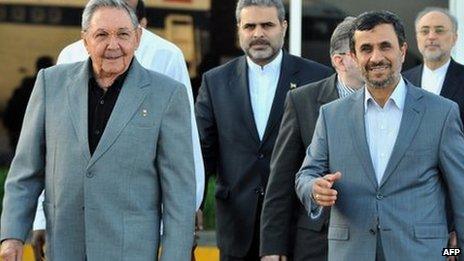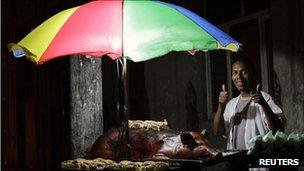Raul Castro's Cuban reform 'without haste'
- Published

Raul Castro was speaking as he said goodbye to Iran's Mahmoud Ahmadinejad
Cuba's President, Raul Castro, has said that a series of unprecedented economic reforms on the Communist-run island are being implemented "as they should be", and would be completed "without haste" in an effort to avoid mistakes.
He was speaking during a brief - and rare - encounter with journalists at the end of a visit by Iran's President, Mahmoud Ahmadinejad.
But Mr Castro also cautioned against expecting too much more from the first-ever Communist Party conference in Cuba, to be held at the end of this month.
"This is an internal matter of the party, to improve it," he said. "It needs a lot of improving in many senses, to adapt to the times we live in."
Raul Castro is also first secretary of the Communist Party, the only political party on the island.
Over the past year Cuba has opened up more of its largely state-controlled economy, expanding self-employment in sectors such as hairdressing and watch repairs.
More than 357,000 people now have licences to trade, helping boost their income considerably beyond the average state salary of just $20 (£13) a month.

Many restaurants and food stalls are already privately operated
Larger, privately run restaurants have also been permitted as Cuba attempts to slim-down the state payroll, and cut costs. The goal is to transfer up to 40% of the workforce into the private sector by 2015, where they'll pay taxes for the first time.
Many moves - such as a decision to allow Cubans to buy and sell property - were approved during a rare Communist Party congress last April.
That congress, Raul Castro said, was the "defining event".
It endorsed what's referred to here as the "updating" or "modernisation" of Cuba's economy, described as critical to securing the long-term future of the socialist revolution.
"It is proceeding without haste, so that we don't make new mistakes," the president said of that process, pointing out that each legal change required "hundreds of hours of study".
"How long it takes will depend on many factors… but little by little, it's being implemented."
Raul Castro formally took over as president in 2008 from his elder brother, Fidel.
Now 85, the iconic leader of Cuba's revolution appears in public very rarely - though Fidel Castro continues to write regular "reflections", most recently on the environment and American politics.
On Wednesday he met Iran's president, in a show of support for an old ally at a time when America and Europe are tightening sanctions on Tehran over its controversial nuclear programme.
The encounter was held away from the cameras but Mahmoud Ahmadinejad later described Fidel Castro as "fit and well", and still an avid follower of current affairs.
"They spent two hours talking," Raul Castro confirmed, just a couple of weeks after the latest internet rumour that Fidel had died.
"I asked who spoke most and [Mr Ahmadinejad] told me Fidel," he laughed. "It's a sign that he's well. Really very well."